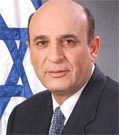Shaul Mofaz - the hawk hovering over the centre
Tel Aviv - Shaul Mofaz is the most hawkish member of Israel's ruling Kadima faction, something he hopes will propel him to the top spot when the centrist party holds its leadership primary on September 17.
Shaul Mofaz is the most hawkish member of Israel's ruling Kadima faction, something he hopes will propel him to the top spot when the centrist party holds its leadership primary on September 17.
A former military chief of staff who became defence minister almost as soon as he left the army, Mofaz is basing his campaign on Israel's security concerns.
It is a tactic which in the past has worked well for successful candidates in national elections, and Mofaz must hope that his approach, coupled with an impressive military resume, is enough to convince the Kadima voters.
But his views - more hawkish than those of his main rival in the race, Foreign Minister Tzipi Livni - have raised fears that if he wins he will turn Kadima into "Likud B, "another version of the hawkish Likud party, the former political home of almost the entire Kadima leadership.
It is a charge Mofaz angrily rejects, telling the Ha'aretz daily earlier this month that "my views are not the same as the Likud."
"I say what I think," he added, and accused Livni of "enveloping herself in formalistic jargon" and "vagueness."
Vagueness is not a charge than can be leveled against Mofaz, certainly not as regards Iran which Israel sees as its biggest existential threat because of Tehran's nuclear programme and the statements by Iranian President Mahmoud Ahmadinejad that the Jewish state should be wiped off the map.
A comment in June that Israel may attack Iran if Tehran developed nuclear weapons caused oil prices to soar, but Mofaz was unrepentant, to the point of repeating the remarks and insisting that time is running out to stop Tehran from obtaining nuclear weapons.
He is equally blunt about the Israeli-Palestinian peace talks, criticising the approach of Livni, who heads the Israeli team in the negotiations which resumed at the turn of the year.
He insists he is not against the peace process, but has questioned the wisdom of conducting the talks according to a strict time table - negotiators pledged to try and reach an agreement by the end of 2008.
His approach is perhaps more reminiscent of someone campaigning for the leadership of one of Israel's right-wing parties, and seems to emphasize the fact that Mofaz was one of the last Likud bigwigs to follow then-premier Ariel Sharon when he formed the Kadima in late 2005 ahead of national elections scheduled for March 2006.
He did so after failing in his bid to be elected Likud leader, and after assuring Likud members that the party was his political home.
Kadima easily won the March 2006 elections, but Mofaz's hopes of continuing as defence minister were thwarted when the post was given to Amir Peretz, the then-leader of the Labour Party, Kadima's main coalition partner.
He was appointed transport minister instead, a relatively junior cabinet post, but was compensated by being appointed deputy premier and placed in charge of Israel's strategic dialogue with the US.
Mofaz was born in Iran in 1948, and emigrated to Israel with his family in 1957.
He enlisted in the Israel Defence Force in 1966, and volunteered for the elite paratroop brigade, seeing service in the Sinai during the 1967 Middle East war.
It was the start of a long and distinguished military career which among other exploits saw him lead a commando team behind Syrian lines in the 1973 war and take part in Israel's daring rescue of hostages at Entebbe, Uganda in 1976.
He was made major-general in 1993, and four years later was appointed deputy chief of staff.
His surprise appointment as IDF chief of staff in July 1998, some observers sniffed, had less to do with his professional qualities - which were not in dispute - than with a personalty conflict between then-Defence Minister Yitzhak Mordechai and the other top contender for the post.
As chief of staff his was the primary responsibility for supressing the Palestinian uprising which broke out in September 2000, a task which brought him no little criticism and accusations of war crimes.
Criticism of his methods continued after he was appointed defence minister in November 2002, four months after leaving the army.
He continued in that post until Prime Minister Ehud Olmert formed his first Kadima government following the March 2006 election.
Mofaz is married and has four children - two sons and two daughters. Three of his children currently serve in the IDF, two of them in elite units. (dpa)